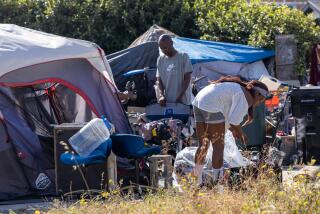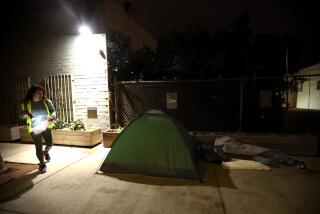Editorial: L.A.’s homeless, in their own words, on how it happened
- Share via
Advocates for homeless people avoid using the phrase “the homeless” because there is no monolithic tribe of people who lost their housing. The details that distinguish their lives emerge from a survey conducted earlier this year by the Los Angeles Homeless Services Authority, which interviewed 3,187 of the more than 44,300 homeless people living in the county .
How did they become homeless? For a fifth of those interviewed, it was primarily a matter of unemployment or finances. Seventy-nine said they were released from jail. Nearly 200 blamed a breakup or separation. Many cited multiple reasons from the list that interviewers read to them.
And some supplied their own answers.
More than 1,100 people cited ongoing health problems, including asthma, diabetes, ulcers, blindness and leg amputations.
“People are creeps.” That’s from a 28-year-old man, a post-9/11 military veteran who spends most nights on the street and showed signs of severe mental illness.
“Raped” reads the notation for a 55-year-old woman.
There is a litany of losses: Lost employment, lost everything by theft, lost Section 8 (federal housing assistance). Hurricane Katrina, fire and “God’s calling” were all cited too.
“Hates Montana’s weather.” That rationale came from a 54-year-old man who left that state several months ago for Los Angeles and told his interviewer he has suffered from drug addiction, mental illness, a physical disability and depression. More than 1,100 people cited ongoing health problems, including asthma, diabetes, ulcers, blindness and leg amputations.
Almost half of those interviewed said they had spent most nights that month on the streets, sidewalks or in alleys. More than 400 said they had lived in a tent recently — some alone, some with tent mates. Others find shelter in cars, campers, vans.
Most have fraught backstories. Consider “RMP,” a 57-year-old white man, homeless for at least a year, who spends most nights in a park, at a beach or a riverbed. A post-Vietnam era veteran, he has had a continuing substance abuse problem and mental illness. He’s been ticketed for all the offenses that get homeless people ticketed: camping, jaywalking, public urination. But he’s also completed some college and he’s using services: housing placement assistance, mental health support. He ticked off a list of things that might have allowed him to keep his home in the first place: help finding work, family counseling, legal assistance. And one other thing: “lottery.”
Many Angelenos will spend a portion of their Thanksgiving — commendably — volunteering at soup kitchens and homeless shelters. But they could help homeless people more by supporting local county and city government efforts to establish the safe parking programs, storage facilities and permanent supportive housing needed in all of our communities. Let’s prove that people are not creeps.
Follow the Opinion section on Twitter @latimesopinion and Facebook
More to Read
A cure for the common opinion
Get thought-provoking perspectives with our weekly newsletter.
You may occasionally receive promotional content from the Los Angeles Times.










